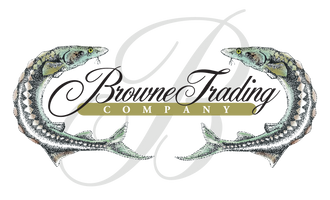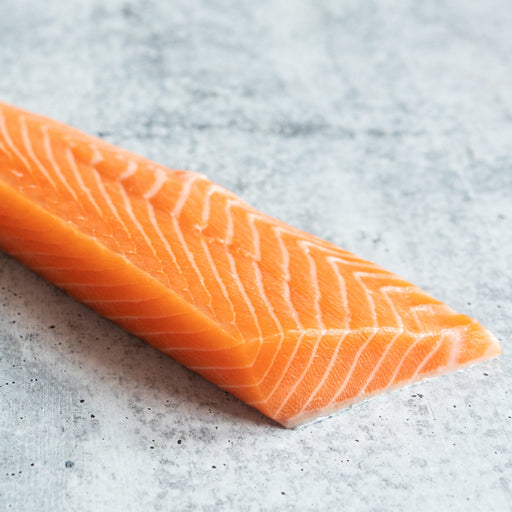
Sustainability at Browne Trading Company
Rod Browne Mitchell has been a trusted guide to quality seafood since he began sourcing for renowned chefs in the early 1980s. As true today as it was then, Browne Trading Company takes pride in providing seafood and caviar of the highest quality, with transparent labeling, that can be directly traced from its supplier to your table.

Part of this task requires a commitment to sustainability, so that all the products we offer can be enjoyed for generations to come. To this end, Browne Trading employs several standards when purchasing to ensure that ocean, human, and seafood health is protected to the greatest extent possible.
Our standards for wild caught products:
- Browne Trading only seeks out wild fish harvested from state, federal, and internationally managed fisheries. We emphasize day-boat fish that are caught using low-impact fishing methods like harpoon and hook-and-line. These methods catch fish slower and in smaller quantities, minimizing by-catch of non-targeted species. Our famous Maine Bluefin Tuna is a fantastic example of a local fish that is line caught by day-boat fishermen.
- In Maine, we hand select only the freshest wild fish landed daily by our local Maine fishing fleet and auctioned at the nearby Portland Fish Exchange. This local fleet abides by sector-based fisheries management, a statewide program designed to ensure the long-term viability of fish populations in the Gulf of Maine. Buying local has a two-fold effect: we have visibility and trust that resources are harvested sustainably, in line with regulation, and we are also supporting the fleets and fishing communities that depend on it, supporting a fishing economy for years to come. In our three decades of buying seafood, we worked with some of the same boats, scallopers, and lobstermen for many years.
- We apply the same standards for fish landed outside of the US, such as our Wild Dover Sole, St. Pierre, and Percebes. A majority of our wild-caught European fish is bought dockside in Portugal and France by committed agents who have been doing business with Browne for years.
Is farmed seafood sustainable?
In a word, yes. Well executed farming can greatly reduce the strain on wild seafoods that are in high commercial demand. Browne Trading proudly imports superior farmed seafood and caviar from around the globe. We have distribution rights, many exclusive, with some of the top producers in the world. Our distinguished line of products include Ora King Salmon, fresh Maine oysters, and Veta la Palma Lubina and Daurade, just to name a few.
All of our suppliers employ best practices that prioritize environmental sustainability. Included below is just a fraction of the standards we use to evaluate farm-raised seafood. Our full standards can be seen here.
-
 Farmed fish must be free of artificial colorants, harmful antibiotics, pesticides, antifoulants, and preservatives.
Farmed fish must be free of artificial colorants, harmful antibiotics, pesticides, antifoulants, and preservatives.
- We require that farmed fish (like our North Atlantic Salmon) are raised in low stocking densities. That means there are fewer fish raised per pen, allowing each fish more room to swim and grow. This promotes fish health, prevents disease, and minimizes effluence from the harvest site.
- For open sea farms, we look for high water tidal exchange and “fallow” system practices, like those seen at Veta La Palma in Spain. This allows farm sites to recover between harvests, minimizing environmental impacts and disease.
- We require that farmed fish are given high quality feed, never from land-based animals or byproducts, and that the feed is certified organic whenever possible. If wild fish are used as feed, we require that they are sustainably harvested where populations are not jeopardized by their use.
- All producers must minimize fish effluent and escape. Fish effluent can degrade water quality, and escaped fish can breed with wild populations, possibly reducing genetic diversity in the species. However, both of these effects can be combated by quality water circulation and careful attention from the producer.
We believe these listed best practices result in superior, healthier products that uphold, if not improve upon, environmental health. Combined with our wild seafood program, Browne Trading offers a wide variety of high quality, transparent, traceable sustainable seafoods.
Featured collection
Ora King Salmon
"The best salmon I’ve ever tasted. Succulent and rich, the cut of salmon transcended salmon." - Food & Wine Magazine on Ora King Salmon 1 skin...
View full detailsNorth Atlantic Salmon
1 skin-on fillet, 3-4 pounds, fresh2 skin-off portions, 1 pound total, frozen Premium quality, sushi-grade fish Sustainably aquacultured Browne be...
View full detailsNorth Atlantic Halibut
2 pound, skin-on fillet, fresh2 portions, skin-off, 1 pound total, frozen Sustainably caught according to local regulations and quotas Landed whol...
View full detailsFarmed Dover Sole
2 whole fish, 2 pounds total, skin-on & gutted4 skin-on fillets, 1 pound total, fresh or frozen Iconic for French cuisine Expertly raised by S...
View full detailsMaine Bluefin Toro
2 pounds, fresh Regulated by ICCAT and NMFS Each purchase supports local fishermen and the Maine economy #1 sushi-grade and never frozen for peak...
View full details










Leave a comment